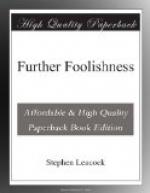“Yes, yes,” said Abdul, “I know—I have read of it, alas, only too often! And they are dead! Toomuch,” he added quietly, drawing a little pouch from his girdle, “take this pouch of rubies and give them to the wives of the dead general of our division—one to each. He had, I think, but seventeen. His walk was quiet. Allah give him peace.”
“Stop,” said Von der Doppelbauch. “I will take the rubies. I myself will charge myself with the task and will myself see that I do it myself. Give me them.”
“Be it so, Toomuch,” assented the Sultan humbly. “Give them to him.”
“And now,” continued the Field-Marshal, “there is yet one other thing further still more.” He drew a roll of paper from his pocket. “Toomuch,” he said, “bring me yonder little table, with ink, quills and sand. I have here a manifesto for His Majesty to sign.”
“No, no,” cried Abdul in renewed alarm. “Not another manifesto. Not that! I signed one only last week.”
“This is a new one,” said the Field-Marshal, as he lifted the table that Toomuch had brought into place in front of the Sultan, and spread out the papers on it. “This is a better one. This is the best one yet.”
“What does it say?” said Abdul, peering at it miserably, “I can’t read it. It’s not in Turkish.”
“It is your last word of proud defiance to all your enemies,” said the Marshal.
“No, no,” whined Abdul. “Not defiance; they might not understand.”
“Here you declare,” went on the Field-Marshal, with his big finger on the text, “your irrevocable purpose. You swear that rather than submit you will hurl yourself into the Bosphorus.”
“Where does it say that?” screamed Abdul.
“Here beside my thumb.”
“I can’t do it, I can’t do it,” moaned the little Sultan.
“More than that further,” went on the Prussian quite undisturbed, “you state hereby your fixed resolve, rather than give in, to cast yourself from the highest pinnacle of the topmost minaret of this palace.”
“Oh, not the highest; don’t make it the highest,” moaned Abdul.
“Your purpose is fixed. Nothing can alter it. Unless the Allied Powers withdraw from their advance on Constantinople you swear that within one hour you will fill your mouth with mud and burn yourself alive.”
“Just Allah!” cried the Sultan. “Does it say all that?”
“All that,” said Von der Doppelbauch. “All that within an hour. It is a splendid defiance. The Kaiser himself has seen it and admired it. ‘These,’ he said, ’are the words of a man!’”
“Did he say that?” said Abdul, evidently flattered. “And is he too about to hurl himself off his minaret?”
“For the moment, no,” replied Von der Doppelbauch sternly.
“Well, well,” said Abdul, and to my surprise he began picking up the pen and making ready. “I suppose if I must sign it, I must.” Then he marked the paper and sprinkled it with sand. “For one hour? Well, well,” he murmured. “Von der Doppelbauch Pasha,” he added with dignity, “you are permitted to withdraw. Commend me to your Imperial Master, my brother. Tell him that, when I am gone, he may have Constantinople, provided only”—and a certain slyness appeared in the Sultan’s eye—“that he can get it. Farewell.”




